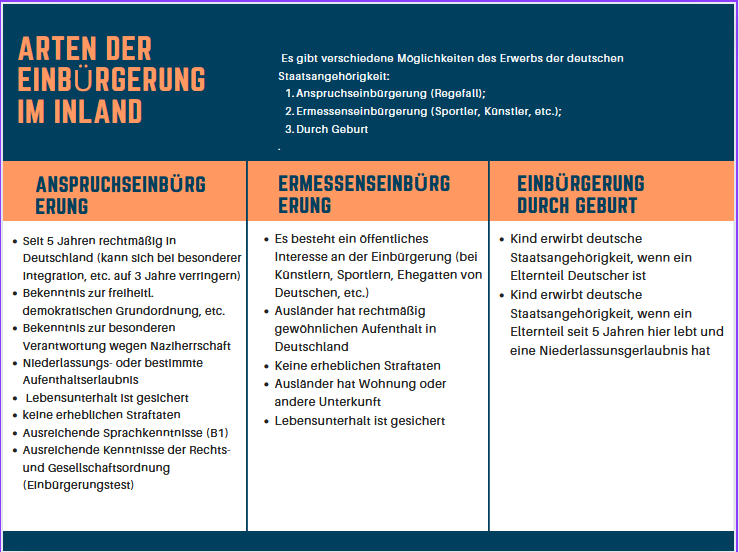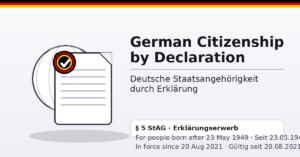German residence titles such as residence permits, settlement permits and EU Blue Cards allow foreign nationals to reside, work and rent a flat in Germany. However, this is not enough for many foreigners, which is why many opt for naturalisation.
Advantages of naturalisation (acceptance of German citizenship)
When naturalising, the foreigner gives up their original citizenship and in return accepts German citizenship. As a result, you have exactly the same rights and obligations as other German citizens, such as voting in elections, free choice of profession and membership of the European Union, which means you can enjoy freedom of movement in Europe and can also travel to many countries outside Europe without a visa. Political participation and legal equality are offered. For the German state, this possibility of naturalising foreigners represents an opportunity to bind people who have been living in the country for a long time and are also successfully involved in society to the German country. There are several legal bases for acquiring German citizenship through naturalisation, most of which are regulated in the Citizenship Act (StAG). There are several requirements that must be fulfilled. These are described in more detail below.
Requirements for naturalisation as a German citizen
It is important to note that naturalisation is not automatic. You can only obtain German citizenship by submitting an application. Before deciding to take this step, you should first check whether you fulfil the required conditions.
The German Citizenship Act (StAG), which regulates naturalisation, distinguishes between discretionary naturalisation and eligibility for naturalisation.
Discretionary naturalisation
Under discretionary naturalisation, for example, spouses of Germans, top athletes, outstanding artists, etc. can be naturalised after a short period of time, usually three years. The situation is different with naturalisation on the basis of entitlement.
Naturalisation claim
In the case of the far more common entitlement to naturalisation, residence must be for at least five years. Under certain circumstances, however, three years is also sufficient. "Special integration achievements" within the meaning of Section 10 para. 3 StAG is an undefined legal term and the language skills mentioned are only one example. Other integration achievements must therefore also be taken into account, such as special achievements in school or training, voluntary, social, community and/or trade union involvement/association activities.
Furthermore, you must be able to finance your own living expenses. If you receive social benefits such as Hartz IV, for example, the application will not be approved. It should be noted that child benefit or Bafög do not count as social benefits. The personal motives for wanting to obtain German citizenship are not scrutinised.
If you meet the requirements for naturalisation demanded by the respective authorities during an individual interview, this is still no guarantee of a successful procedure. Each application for naturalisation is examined by the relevant authorities on a case-by-case basis.
The basic naturalisation requirements for eligibility for naturalisation are presented here once again:
-
-
- Indefinite or permanent right of residence at the time of naturalisation
- Commitment to the free democratic basic order of the Basic Law
- Oral and written German language skills at level B1 of the Common European Framework of Reference for Languages.
- Proof of knowledge of the legal and social order and living conditions in Germany (naturalisation test)
- Independent means of subsistence for themselves (and, if applicable, for dependants)
- No conviction for a criminal offence
-
How does the naturalisation process work?
You must first apply for German citizenship. The immigration and citizenship authority in the city in which you live is responsible for processing the application. In some federal states, the Citizens' Registration Office or the Aliens' Registration Office is the right point of contact. In Cologne, for example, you can only obtain the necessary form for naturalisation during a consultation. In most cases, however, you can download the form from the website of the respective city. However, it is recommended that you collect your application for German citizenship in person. In such cases, the authority employees can give you individual advice and explain the specific features and explicitly tell you which documents are required in addition to the application in your own case. Persons living abroad permanently can only be naturalised under certain exceptions. (naturalisation abroad). The Federal Office of Administration in Cologne is responsible for this. However, the first point of contact here may be the locally responsible German mission abroad (embassy, consulate general or other consular office).
As a rule, the following documents are required for submission with the application:
-
-
- Completed application form
- Birth certificate
- Copy of the passport
- Copy of the residence permit in Germany
- Language certificates (level B1)
- Employment contract
- Rental agreement
-
The exact documents required vary from person to person and from authority to authority. It is best to enquire with the relevant authority in advance. This is because an incomplete application can quickly lead to delays.
Sufficient language skills
One of the essential requirements is that you have sufficient language skills. In principle, at least level B1 (sufficient language skills) is required. If no corresponding proof of sufficient language skills can be presented, a language test must be taken. In this test, you must be able to demonstrate that you can communicate sufficiently in German. For naturalisation applicants who have a German school-leaving certificate, proof of language skills can be waived. Even if the foreigner's language level is clearly very high, it may be unlawful for the naturalisation authority to insist on a certificate for purely formalistic reasons.
Naturalisation test
You also have to pass a naturalisation test. This tests the extent to which you have familiarised yourself with the legal, social and democratic order in Germany. This test consists of 33 questions, three of which relate specifically to the federal state in which you are registered. Once at least 17 questions have been answered correctly, the test is deemed to have been passed. This is intended to provide information on whether the first steps towards integration have been taken. Naturalisation applicants who have a German school-leaving certificate do not need to take the naturalisation test. All the questions on the naturalisation test can be viewed in advance on the website of the Federal Office for Migrants and Refugees (BAMF) and you can even take a mock test.
Assurance of naturalisation and renunciation of foreign citizenship
If all the required conditions are met, the application will be approved and you will receive a confirmation of naturalisation. This allows you to take the next step and is by no means the naturalisation itself. This assurance can also be withdrawn if the applicant's situation changes. You must now endeavour to renounce your current citizenship, whereby different conditions apply depending on the country of origin. If you can show that you have renounced your original citizenship, naturalisation will now take place. If, for example, the country of origin does not allow a release from citizenship, does not respond to the application for two years or does not provide for the renunciation of citizenship, the old citizenship can be retained in exceptional cases. In these cases, naturalisation with dual citizenship is possible.
As soon as all the steps have been completed, a naturalisation certificate is sent by post. This document seals the naturalisation and you have become a German citizen. You can then apply for an identity card and passport at the citizens' office.
Currently, the costs are €255 per applicant and €51 per child who is to be naturalised together with their parents. The authorities are generally flexible when it comes to paying this amount. The fee can be reduced, paid in instalments or even waived completely if the person concerned can prove that they have a low income or if the naturalisation process involves multiple payments. There is also a €25 fee for the naturalisation test and any additional costs for issuing or certifying various documents. The duration of the procedure can vary greatly. As soon as the application is submitted with all the necessary documents and a successful release from the original citizenship has been obtained, naturalisation can be expected within six weeks. If problems arise in communication with the country of origin and documents may need to be submitted later, the process can even take over two years.
Facilitating naturalisation for refugees
Refugees who have been granted asylum in this country can also apply for naturalisation after a certain period of residence, whereby they must also meet the above-mentioned requirements. However, the state does grant relief in certain respects. This relief is justified by the fact that the refugee cannot plan their stay in Germany in advance during their flight and a residence permit in the asylum procedure is only temporary at the beginning.
The following simplifications apply, whereby all other conditions must be fully met:
-
-
- Language skills do not necessarily have to correspond to B1 level. Nevertheless, those affected must be able to communicate sufficiently in German.
- Easier criteria apply for the naturalisation test.
- The regular minimum period of residence is six years, not the usual eight years.
- Dual citizenship is possible if the persecution continues.
-
Naturalisation of children
Special regulations apply to the naturalisation of children of foreigners between the ages of eight and sixteen. A child cannot be required to take a naturalisation test, but must still provide proof of basic knowledge of the German language. A minimum residence period of eight years is mandatory, whereby this applies to both the child and its parents. The question of exemption from punishment must also be answered, as children aged 14 or older are considered to be of criminal age. It should be noted that as soon as one parent has German citizenship at the birth of the child, naturalisation of the child is not possible according to ius sanguinis (right of blood) is possible.

The following court judgements deal with naturalisation:
Foreigners Law: Participation in anti-constitutional events excludes naturalization.
Immigration Law: Naturalization of a Foreigner Due to Marriage to a German Citizen
Immigration Law: On Identity Verification in the Naturalization Process
Immigration Law: Fraudulent Deception About Naturalization Intent Leads to Revocation of Citizenship
Immigration Law: No Naturalization Under § 8 StAG Without Relevant Clean Criminal Record
Immigration Law: Public Interest in Uniform Family Citizenship in the Naturalization Process
Immigration Law: Naturalization acquired under a false identity is void.
Immigration Law: Establishing Identity is a Prerequisite for Naturalization
Important Note: The content of this article has been prepared to the best of our knowledge and belief. However, due to the complexity and constant evolution of the subject matter, we must exclude liability and warranty. Important Notice: The content of this article has been created to the best of our knowledge and understanding. However, due to the complexity and constant changes in the subject matter, we must exclude any liability and warranty.
If you need legal advice, please feel free to call us at 0221 - 80187670 or send us an e-mail to info@mth-partner.de





2 responses
Hello I am looking for your address but unfortunately I can't find it how can I come by please
With kind regards from
abbas family
Sachsenring 34, 50677 Cologne